‘It’s like torture’: Families report deputy harassment to sheriff watchdog
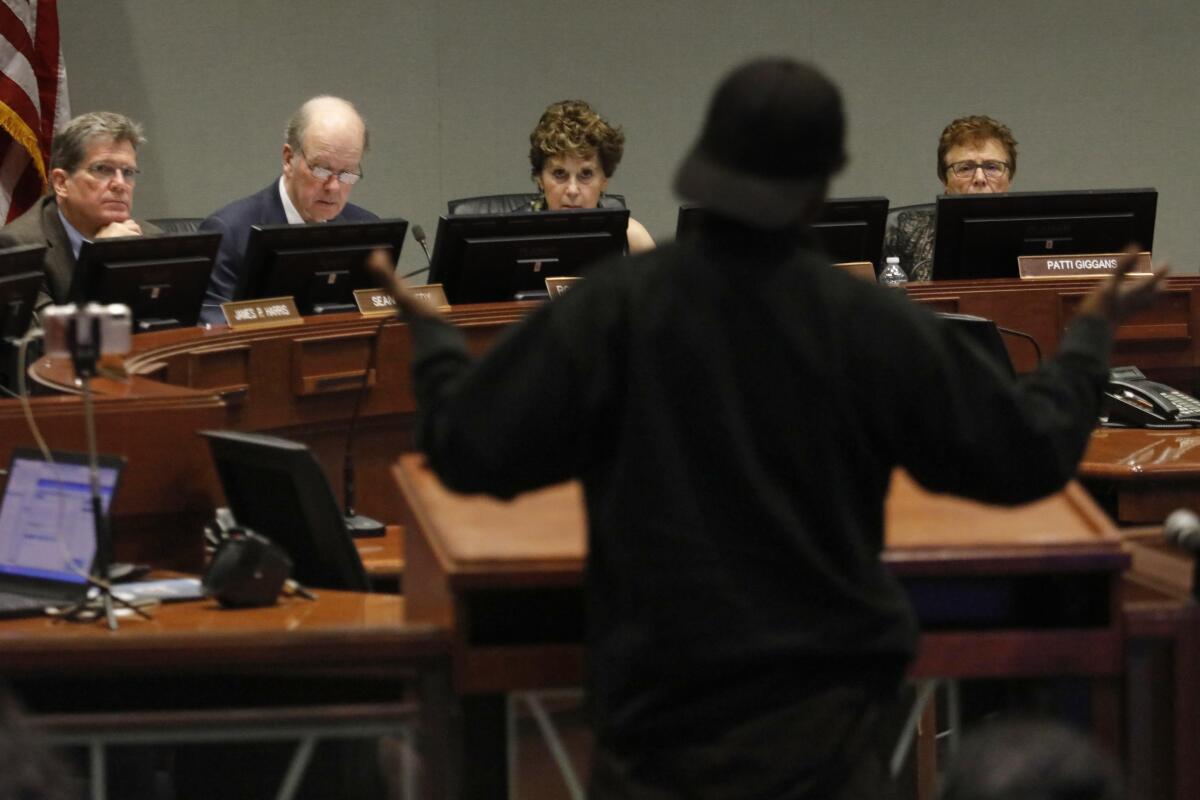
One by one, grieving relatives stood before the Sheriff Civilian Oversight Commission on Tuesday and described the harassment they said they’ve faced since their loved ones were killed by Los Angeles County deputies.
Sometimes, speakers said, deputies slowly drive by their homes during family gatherings. They showed up at one man’s funeral and, in another incident, pulled over his relative’s car, commissioners heard.
“It’s like torture for you to keep driving by us, and laughing or smirking or flicking us off and all that every single chance y’all get,” said Davielle Johnson, the girlfriend of Ryan Twyman, 24, who was shot and killed by sheriff’s deputies at a South Los Angeles apartment complex in early June.
After the testimony, the commission directed the Office of the Inspector General to examine whether patrol staff are harassing families of people killed by deputies. It also requested that the Sheriff’s Department conduct its own investigation into conduct at the East L.A. and Century stations. Commissioners asked for reports back in 60 days.
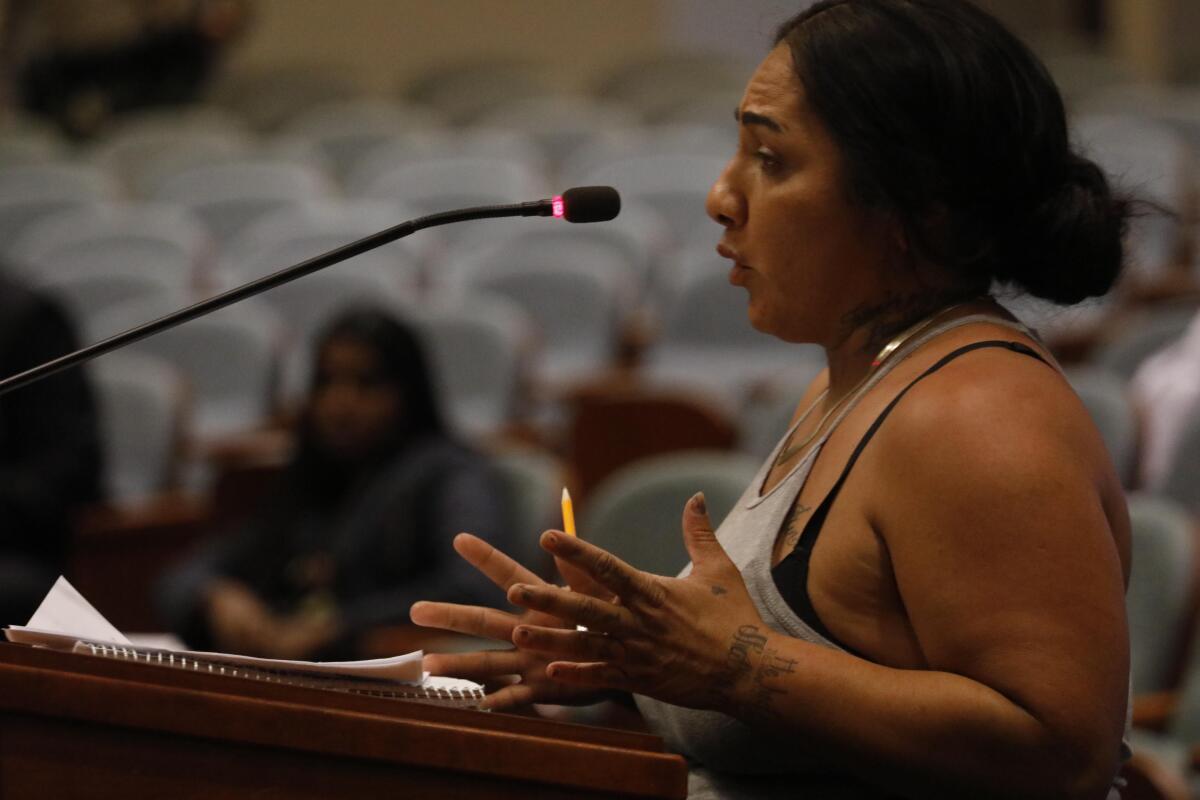
“They feel intimidated,” said commission Chairwoman Patti Giggans. “It’s an issue that we really have to look into seriously.”
Asst. Sheriff Steven Gross, who oversees patrol operations, said the Sheriff’s Department takes allegations of harassment seriously and will look into any complaints brought forward.
“It is not acceptable for any of our personnel to harass anybody, period,” Gross said. “If anyone was engaged in misconduct we would want to know about it and we would want to hold them accountable.”
Det. Ron Hernandez, president of the Assn. for Los Angeles Deputy Sheriffs, said: “Anytime an allegation of misconduct is made I trust it will be thoroughly investigated, and I have no reason to believe it will be any different, with or without the involvement of the Civilian Oversight Commission.”
In interviews with The Times, family members of three people killed by officer gunfire recounted what they described as harassing encounters with deputies.
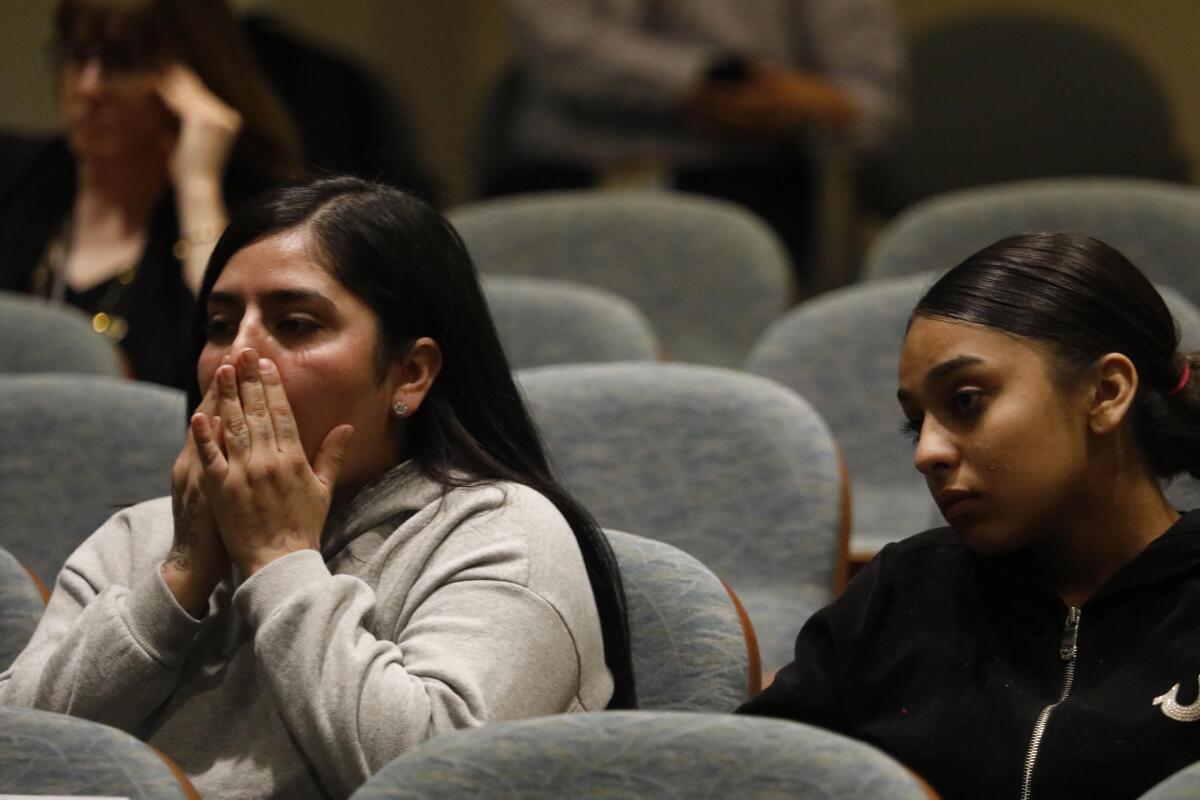
Jaylene Rea said she and her family have created a roadside memorial at the site of her brother’s death, down the street from their East L.A. home. A group gathers there most nights lighting candles next to photos and flowers.
Paul Rea, 18, was shot and killed in June during an altercation after a traffic stop. Authorities said a gun was recovered from the scene.
Four or five times a week, patrol cars slowly drive by during the family gatherings, Jaylene Rea said. She provided The Times with several video clips she, her sister and her cousins have recorded of the encounters.
In one, the deputy at the wheel holds his phone up as if he’s recording. In another, a group of uniformed deputies walk up and one directs the group to stay off the street. Later an officer says: “We’ve had 39 calls, we’re just saying keep it down.” The deputies walk away and return to their cars soon after.
Rea spoke about her brother’s death last month at a rally organized by the American Civil Liberties Union that was held outside the county Hall of Justice. Several affected families showed up to demand more information about the circumstances of the shootings.
After the rally, Rea and other demonstrators attended a town hall in Temple City, where her grandmother attempted to serve Sheriff Alex Villanueva with a lawsuit seeking police records under SB 1421, a landmark transparency law that requires public release of some records related to police misconduct and serious uses of force.
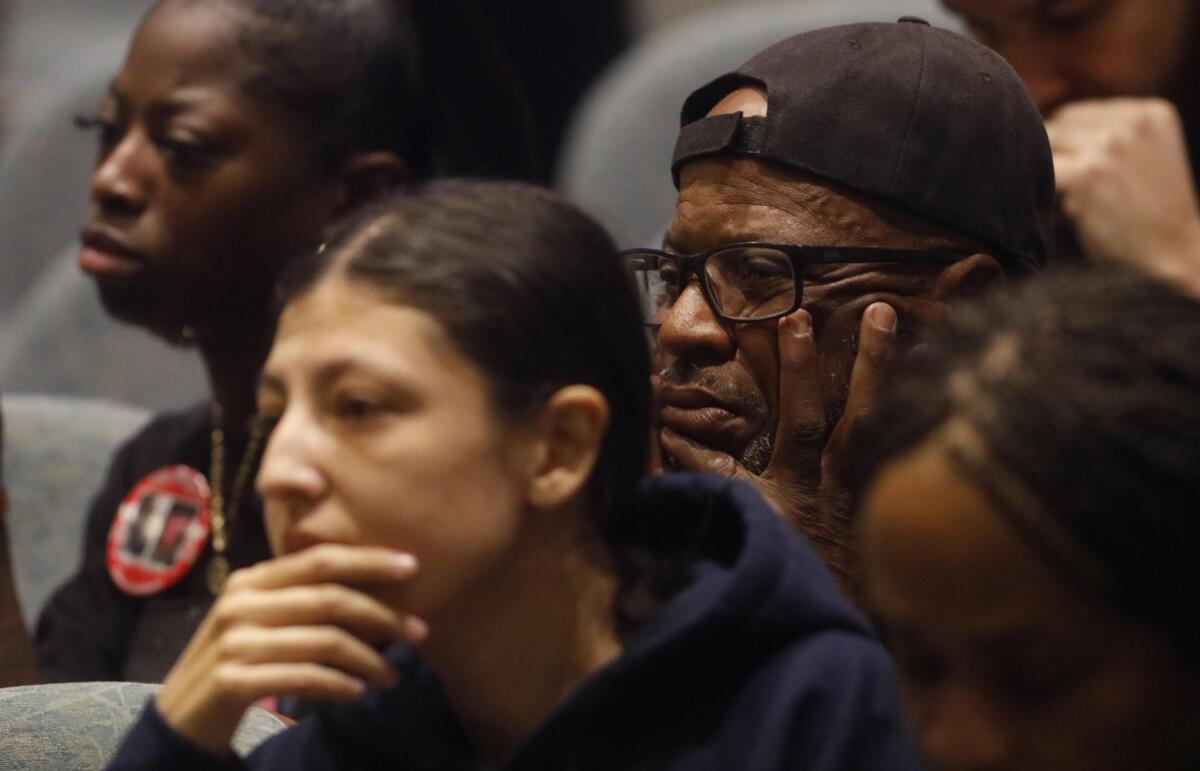
Later that night Rea and her family gathered at the roadside memorial.
After they arrived, Rea recorded two patrol cars slowly driving by. With his window down, one deputy waved.
Deputies returned later and ordered a member of the group to extinguish a marijuana cigar.
Rea said the man passed the cigar to her and she put it in her pocket so she could step back and record his arrest.
Moments later, she said, a deputy grabbed her wrists and lifted her arms behind her back, causing her to bend over in pain. She said she was put in the back of a patrol car, where she complained of excessive force and asked where she was going.
“None of your business,” she said she was told. “You’ll see when we get there.”
She was taken to a hospital for evaluation and later booked on suspicion of concealing evidence, a misdemeanor.
“At that moment I’m thinking, ‘This is it. I never got a chance to get my son back, now my daughter’s not going to come home either,” said her mother, Leah Lorraine Garcia.
L.A. County Sheriff’s Sgt. Tom Kim said deputies were arresting someone on suspicion of smoking marijuana in public when Rea took the evidence, which he identified as narcotics, and walked away. He said the investigation is ongoing.
Rea was held in a cell overnight. When her phone was returned, two videos she’d recorded of deputies the night before had been deleted, she said. She said she was able to recover the deleted files.
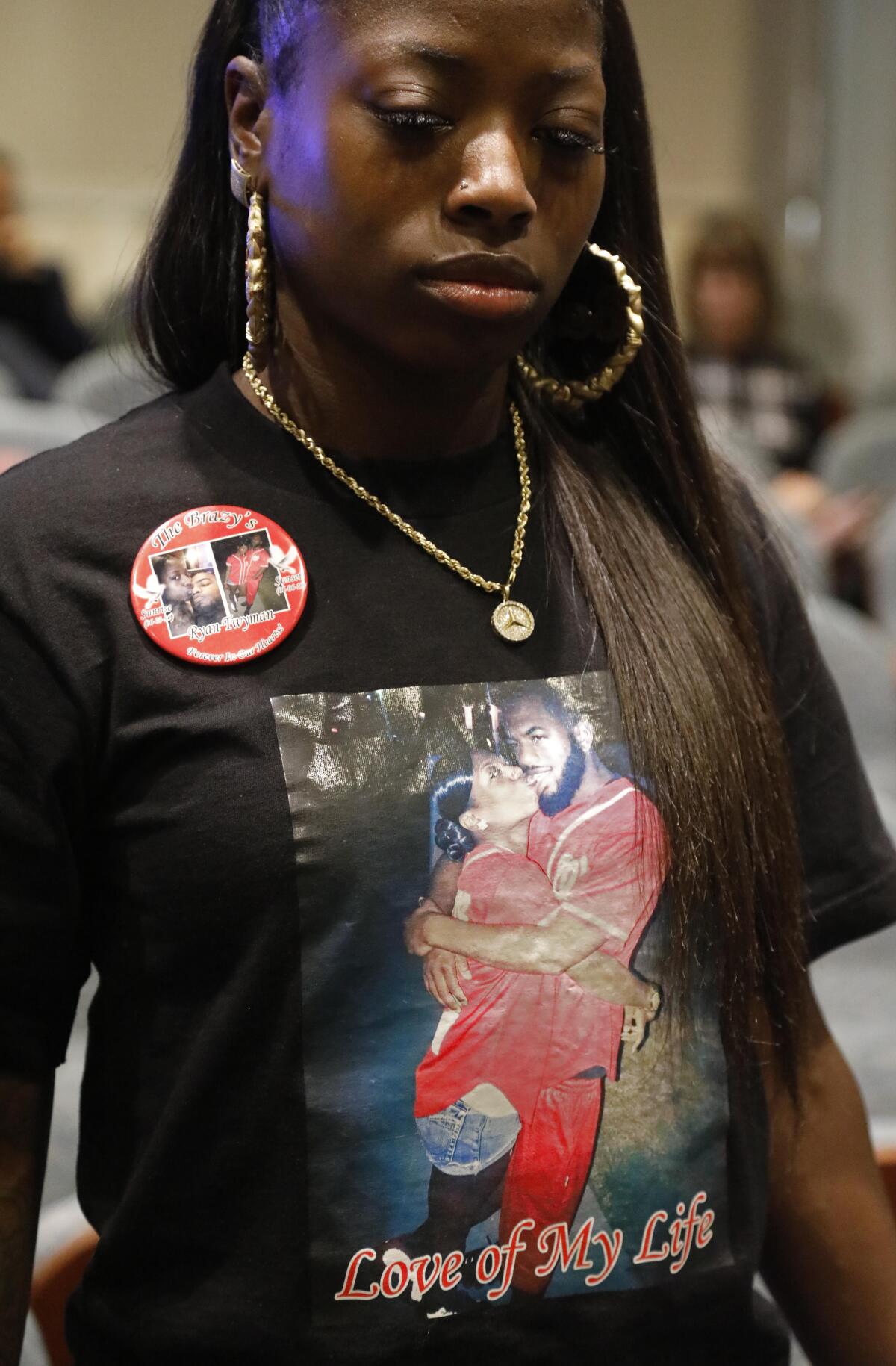
“Since the beginning, they’ve been messing with us, doing little weird things,” Rea said. ‘They’ve come by, laughed at us, took videos of us with their own personal cellphones.”
The Rea family spent the next two nights in a hotel, too afraid to go home.
Civil rights activists wrote a letter to the Board of Supervisors and Dist. Atty. Jackie Lacey saying they were “deeply concerned” about the arrest and urged an investigation.
“Family members have feared that deputy sheriffs will taunt them, arrest them, or even physically hurt them — not because they have done something wrong, but simply because they have spoken publicly about their loved ones’ deaths and have sought transparency and accountability,” the letter said. It was signed by the Centro Community Service Organization, Black Lives Matter Los Angeles and the ACLU of Southern California.
In interviews, relatives and friends of Twyman and Anthony Vargas, 21, who was shot and killed in August 2018, described similar encounters with deputies. Authorities said they were searching for three robbery suspects when they tried to detain Vargas and a violent struggle ensued.
“If I wasn’t as nervous as I am, I would’ve reached for my phone to record,” said Vargas’ aunt, Stephanie Luna, referring to a night when a patrol car pulled up and stopped in front of her driveway with its lights off.
A staffer with the Office of Inspector General had asked Luna earlier at the hearing if she had videos because the office was collecting footage of the incidents.
In another incident, deputies pulled up outside Twyman’s home in Compton during a gathering and asked if they could have a pin with his picture on it, Johnson said.
Twyman’s sister, Dominique Brown, has one young child; Twyman left behind three.
“How can we teach them to have faith if we don’t?” Brown said.
More to Read
Sign up for Essential California
The most important California stories and recommendations in your inbox every morning.
You may occasionally receive promotional content from the Los Angeles Times.











